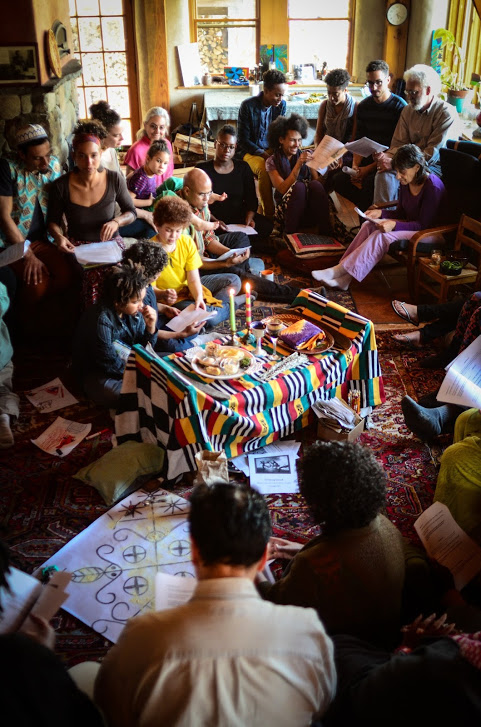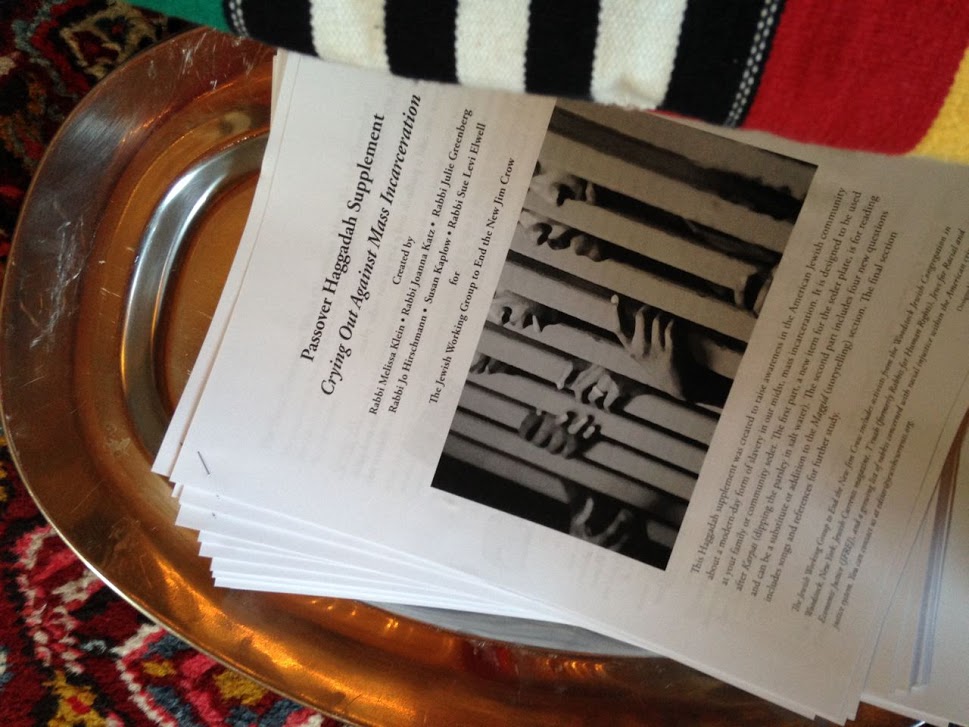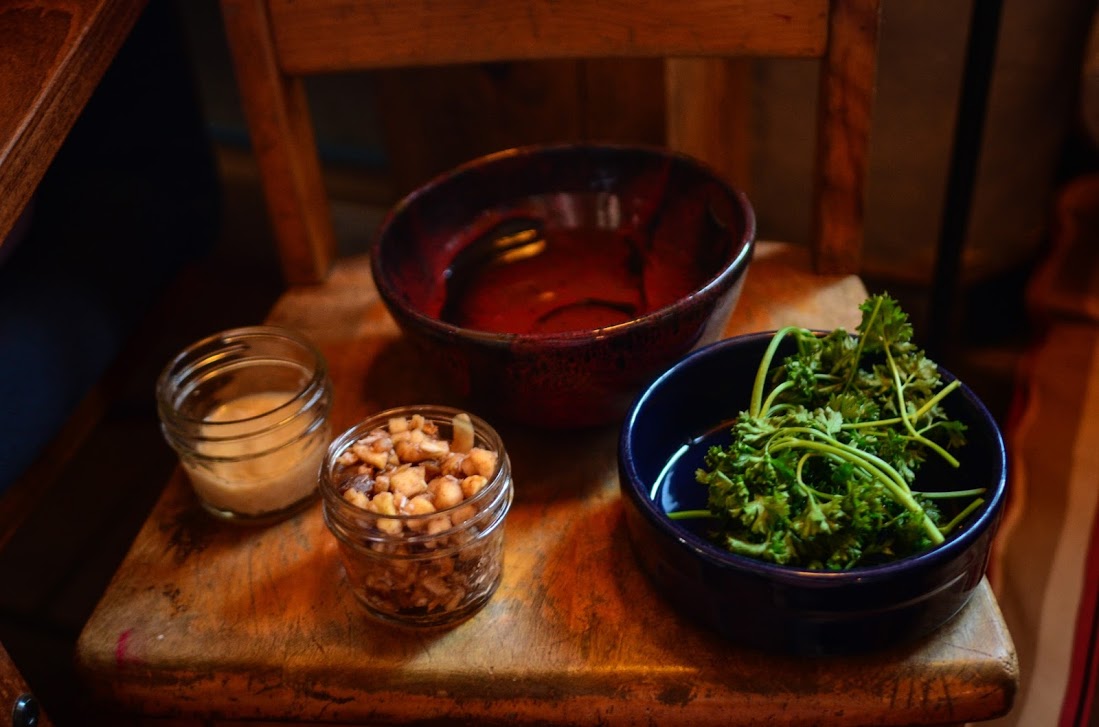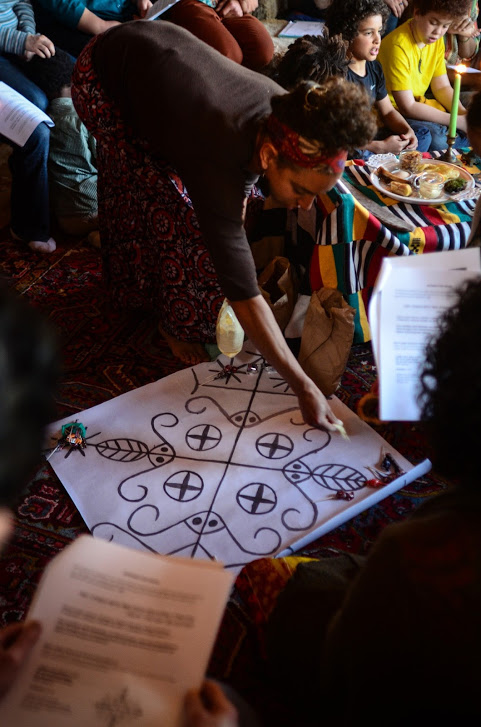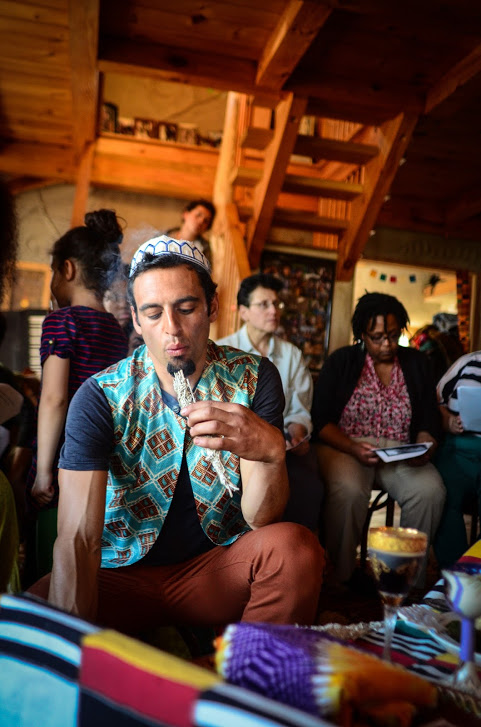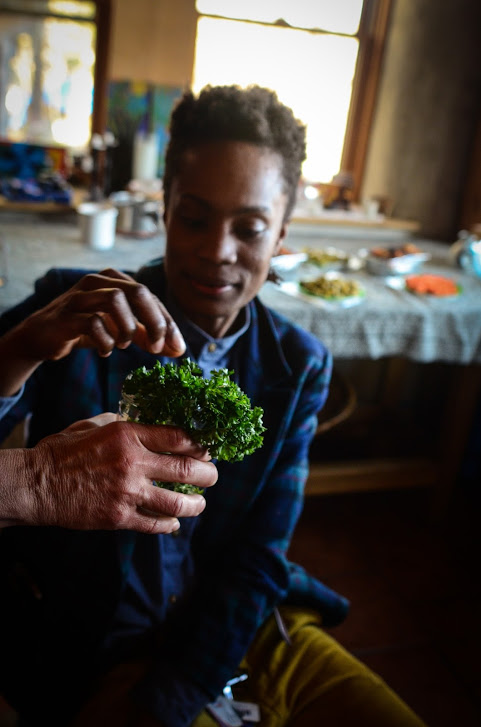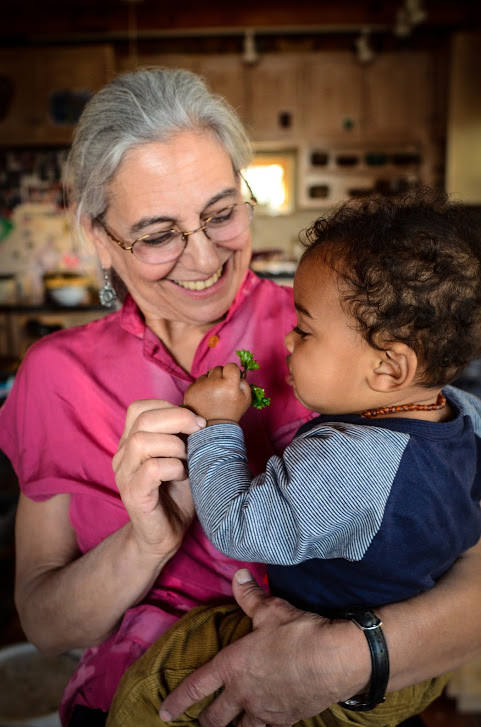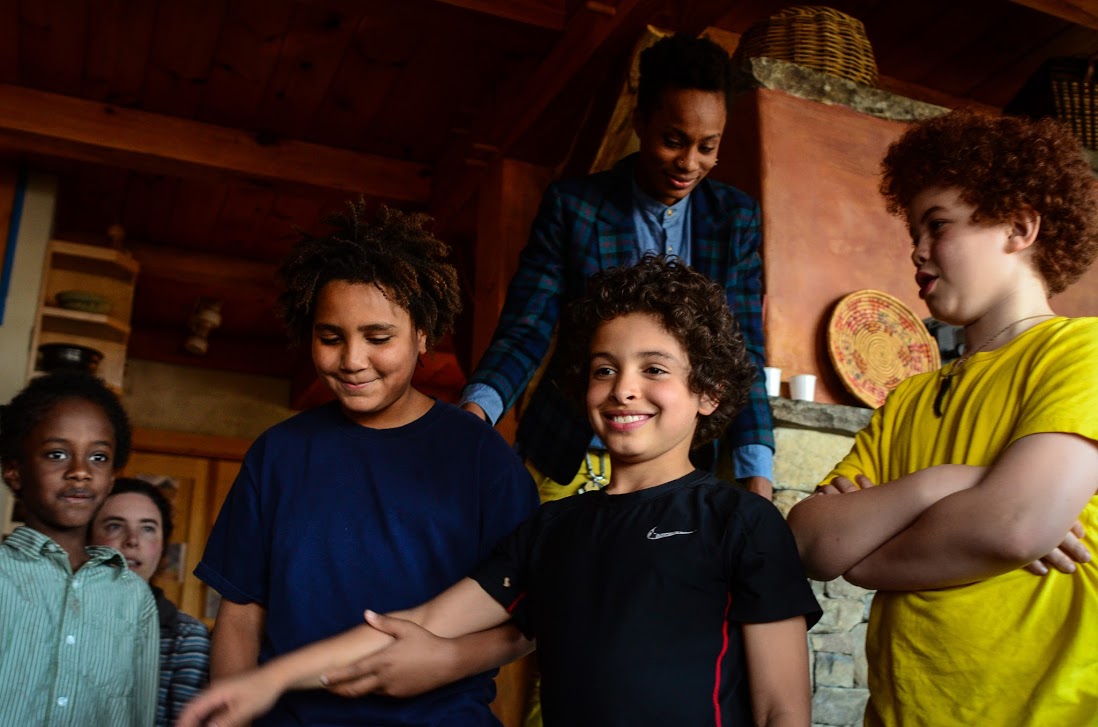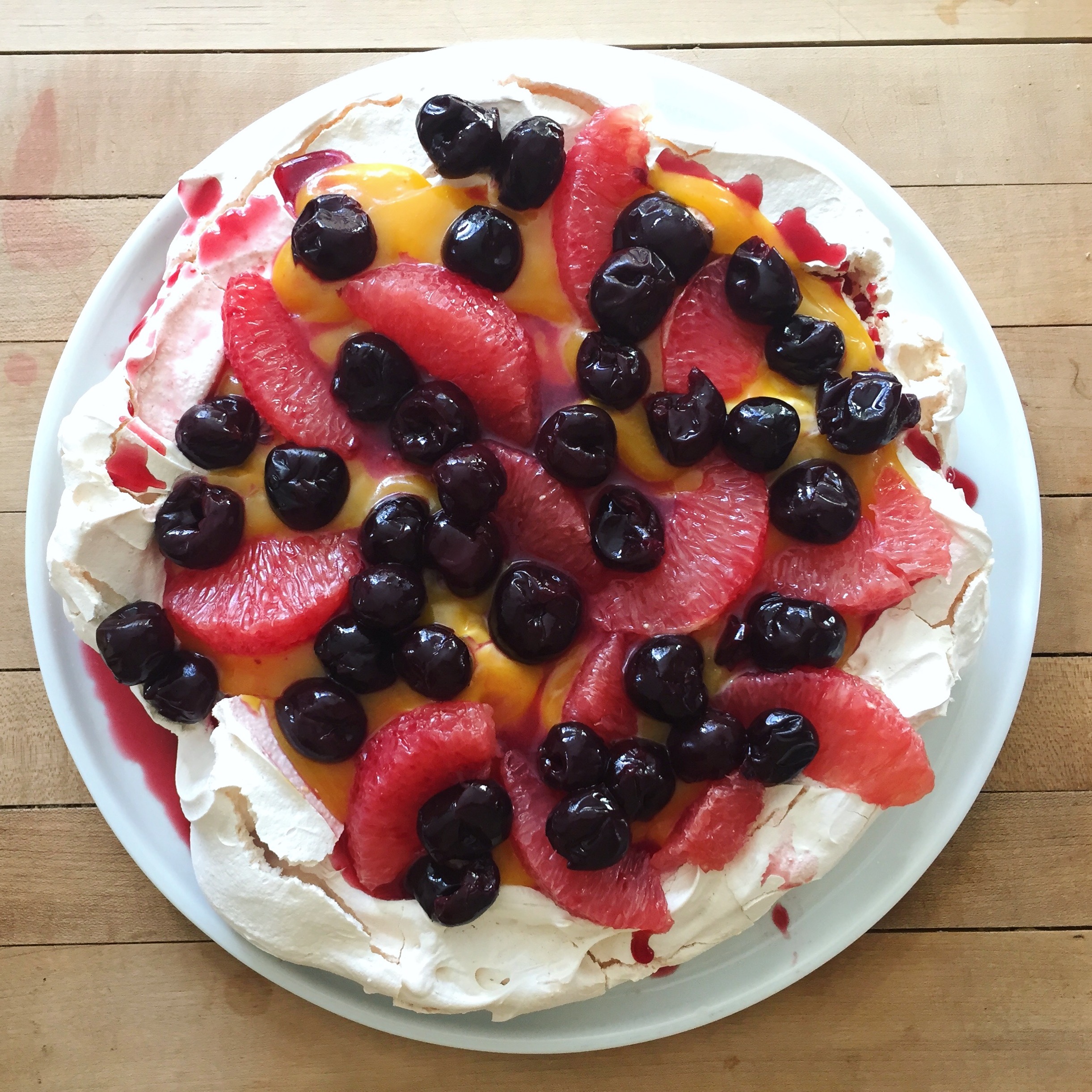Afro Seder & Y-Love Hip Hop
Black Jewish people and their friends and families gather at Soul Fire Farm for the annual Afro Seder, a melding of Jewish and African diaspora traditions and stories about liberation.
"Passover is both political and spiritual. Holiness is about having the capacity and freedom to affect the world and make a choice to use our power for the liberation of all people." -Leah Penniman
Spring is in full swing, which means that the Easter and Passover holiday season are here. As a Jewish person myself, I participate in a passover seder ceremony and meal each year with my family, where like many jews around the world, we retell the story of the jewish exodus from Egypt, from slavery into their lives in freedom. At the seder table we eat foods that represent the struggles of slavery and exodus, such as charoset, a mix of apples and spices that represents the mortar used to build the pyramids, salt water that represents the tears shed by jews who were suffering, and probably the most famous passover food, Matzo, which is an un-leaven bread sort of like a large cracker, that represents the dough cooked by the jews while they were escaping from slavery, when they didn’t have enough time to let the bread dough rise.
The retelling of the Jewish story of slavery and liberation is a powerful experience, and I have often thought that it would be a beautiful thing for many other peoples in the world to get to have a similar experience of acknowledging struggle and oppression as a people while also reflecting on freedom and the work still to be done. At our seder table this is not only an idea, but a reality. One side of my husband’s family is of African American and Native American descent, and on the other side, Irish, so at our seder table we have people of other lineages who have also suffered slavery, oppression and genocide, as well as liberation. To talk about slavery and not acknowledge this reality (whether in our own families, or just in the world) would be an injustice.
A few years ago I met and became dear friends with Leah Penniman and Jonah Vitale Wolf of Soul Fire Farm in upstate, NY. You may have heard another interview I did with Leah and her sister on the Heart of Community Building, and no doubt she will be a reoccurring guest on the table underground as there are many overlaps in our work and passions.
Jonah, her husband is a sephardic Jew of Italian and Middle Eastern descent and Leah is Jewish and also of Haitian descent. Each year at spring they hold an Afro Seder gathering which is a coming together of Black-Jewish people and their families to share their own liberation stories and draw from their multiple traditions those elements that are unifying and apply across all peoples. Through the seder ceremony, the parallel stories are told of Moses and Harriet Tubman leading their people to freedom.
I welcomed Leah to talk about how the Afro Seder came about, and the importance of this ritual for those involved. Listen to the full interview by clicking the play button at the top of this page, or on itunes, sound cloud or other podcasting sites.
Scroll down to see pictures of the 2014 Afro Seder, as well as to get the recipe for Soup Joumou, "Liberation Soup" a pumpkin soup made by the Haitian people when they overturned slavery and won freedom from France. During slavery and occupation, the Haitian people were forbidden from eating this rich pumpkin, which is why, upon winning their freedom, it became an perfect symbol for liberation.
Soup Joumou - "Liberation Soup"
Prep Time: 45 minutes
Cook Time: 1 hour
Yield: 6-8 servings
Ingredients
1 lb butternut squash or Caribbean pumpkin, peeled and chopped
8 cups water
4 cloves garlic, crushed
1 celery stalk, chopped
1 large onion, chopped
2 potatoes, chopped
½ lb cabbage, chopped
1 turnip, diced
2 carrots, chopped
2 leeks, chopped
1 cup sweet corn, fresh or canned
1 tbsp chopped parsley
1 whole scotch bonnet pepper or other spicy pepper
¼ lb pasta (optional)
1 tbsp lime juice
2 whole cloves
1 can (12 oz) whole coconut milk
salt `
pepper
thyme
splash of sweetener (optional)
Directions
Preheat oven to 450 degrees. Coat the squash/pumpkin in oil and roast in a single layer on a sheet pan until golden brown and tender. Simultaneously, in a separate pan, roast the remaining vegetables (except corn, parsley, hot pepper) in oil and a bit of salt until golden and tender.
Blend the cooked squash with coconut milk in a blender or food processor. Pour the squash puree into a pot, add the water and bring to low boil. Add the roasted vegetables and the corn, parsley, and hot pepper, and add spices (and sweetener if using) to taste. Cook for 15-20 minutes to bring the flavors together. If you are using pasta, add it when there are 10 remaining minutes of cook time.
Y-Love | Talented Jewish, Gay, Black & Latino Rapper
Y-Love smashes stereotypes daily, and it can't be easy, but he does it with flare, and I for one am grateful. Check out this interview set up by Russel Simmons where Y-Love talks about , and this pop-culture video if you'd rather watch some clips than read.
"whatever you've got to do to get the Torah into here (your head) and here (your heart) is automatically kosher."
Y-Love speaks truth about religion and tradition as a living culture, not one frozen in time: "When the rabbi from Beni Barka came out against hip hop and said that hip hop is disgusting, and has no place in the Jewish Community, I'd like to know what type of holy European melodies that he's listening to. Because the reality is, that which is called Jewish music today, a lot of it is, when you are listening to the "holy" Hasidic melodies of the old country, all you're actually hearing is the top ten pop hits of 1804. So, to say that this is automatically, authentically more Jewish, simply because it originated in Eastern Europe, I don't know how else to take that, but racism. Hip hop is the way that I express myself spiritually...this is my Judaism that I'm expressing over here!"
Pavlova & Pink Grapefruit Curd
A dessert perfect for Passover, adding sweetness to the end of the night of remembering slavery and oppression, and a moment to look towards the sweetness of liberation.
Get the recipe and read more HERE.
Also check out this fabulous sephardic (non-eastern European) Jewish recipe for Charoset, which uses dried fruits rather than fresh apples, which often get soggy.
Ep. 11 — The Table Underground — Apr 7, 2017


